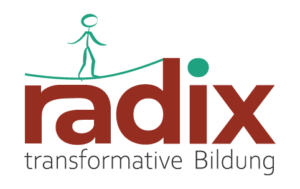Brief description
In this exercise, participants deal with social values and enter into discussion about them.
Work material to download
Learning objectives
The participants…
- get a playful approach to questions about social values.
- reflect their own needs and values within society.
- practice „utopian thinking“.
Procedure
Background
We all have an idea of what is important to us for living together in a society shaped by our personal values and convictions that guide our actions. The participants engage in conversations exploring how a society might look if individual values were to become more central to society.
Preparation
The cards with the values and a brief explanation of each value are distributed around the room. In addition, 3-6 more blank DINA4 sheets & pens are distributed around the room. A glass is placed on each sheet. The glasses should all be the same shape and size. The question „What is important to us for a utopian society?“ can be hung up in the room.
Execution
1. (10-15 minutes) Introduction
After the facilitator has explained procedure and background of the method, the participants can walk around the room and look at the individual value cards. If participants still miss values that are important to them, they can write their own values on the blank papers with pens. If necessary, the facilitator can add more paper.
2. (5-10 minutes) Weighing Values
The facilitator poses the question: „What is important to us for a utopian society?“ Each participant is given a handful of corn grains. Depending on which values they find important and how important, they distribute their corn grains among the corresponding glasses. As soon as a participant has distributed all the corn kernels, the person sits down again.
3. (5-10 minutes) Looking at the results
After all participants have distributed their corn kernels, everyone looks at the filled jars. The facilitator reads out all the values one after the other and holds up the corresponding jar for everyone to see. The glasses of varying fullness show that we, both individually and as a group, weigh individual values differently. How these values are weighted can vary from person to person, from group to group and from society to society. What the corresponding weighting means within the group can be reflected together in the evaluation.
4. (5-10 minutes) Finding groups
The evaluation takes place in small groups. To do this, each participant thinks about which value the person would like to continue working on and stands next to the value card. This should result in small groups of about four people. If necessary, the facilitator can divide a large group again to work on one value. It is not a problem if there is not a small group for each value.
5. (20-30 minutes) Discussion in small groups
The small groups find a place and discuss the following questions (download material):
- How did you feel when distributing the corn kernels?
- Were you surprised by the result?
- What reasons do you see behind the result? Do you think the result would be different in a different context/at a different time?
- What would a society look like if this value was at the center? What would be different from now?
6. (5-10 minutes) Evaluation in plenary
At the end, everyone comes together in the large group. Plan at least five minutes for final thoughts or open questions.
Variants
- If there are not enough jars of the same shape and size to hand, the grains can alternatively be placed on a separate empty sheet.
- Instead of corn kernels, you can also use something similar, e.g. lentils, rice or even water.
Tips and notes for facilitators
With this method, it is important to create a space in which different perspectives on individual values can coexist. It is not about placing individual values above others. Rather, it is about becoming aware of one’s own values, placing them in a wider context and discussing what this means for society.
Possibilities for further work
Thread game (Betzavta exercise), Future for All, Building blocks for climate justice, Interview from the future, How do we want to have lived?
Working material for download
- Values
- Questions for small groups
Sources:
- Kuhnhenn, K. / Pinnow, A. / Schmelzer, M. / Treu, N. / Konzeptwerk neue Ökonomie e.V. (2020): Zukunft für alle – Eine Vision für 2048: gerecht. ökologisch. Machbar, Oekom.
Funded by the European Union. Views and opinions expressed are however those of the author(s) only and do not necessarily reflect those of the European Union or the European Education and Culture Executive Agency (EACEA). Neither the European Union nor EACEA can be held responsible for them.


